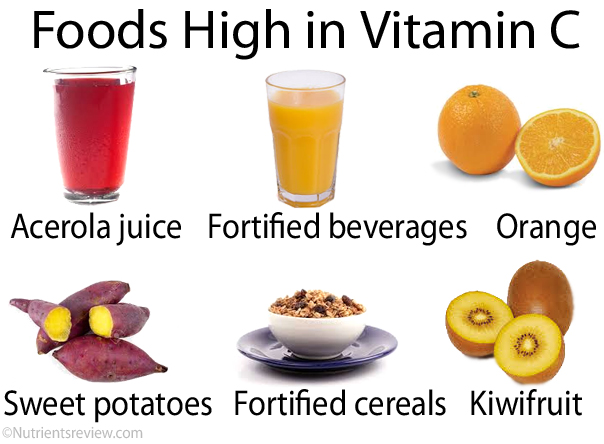Recommended Daily Intake
According to the Institute of Medicine in the U.S., the Recommended Dietary Allowance (RDA) for vitamin C for adult men is 90 mg/day, for women 75 mg/day, during pregnancy 85 mg/day and during breastfeeding 120 mg/day [1].
Foods Rich in Vitamin C
Picture 1. Foods high in vitamin C
- Main vitamin C sources are vegetables, fruits and fortified cereals and beverages.
- Organ meats are high in vitamin C but other animal foods contain only moderate amounts.
- Human breast milk contains sufficient amount of vitamin C to meet the needs of infants 0-12 months of age [1,3].
- Freezing can decrease the vitamin C content of foods by about 30%, storage for 7 months by 80%, drying by 80%, cooking by 20-50%, cooking and draining by 75% and reheating by 50% [4,5].
Vitamin C Supplements
Without prescription (over-the-counter) in the form of tablets or capsules [9]:
- L-ascorbic acid, natural or synthetic, which are chemically identical
- Sodium ascorbate and calcium ascorbate, which are less acidic and thus supposedly less irritating for the stomach
- Ascorbyl palmitate, an ester of ascorbic acid and palmitic acid (a fatty acid)
- Vitamin C in multivitamin supplements
- Vitamin C combined with minerals (chromium ascorbate, magnesium ascorbate, manganese ascorbate, molybdenum ascorbate, potassium ascorbate)
- Vitamin C combined with bioflavonoids
- Vitamin C combined with drugs, such as aspirin or paracetamol
Available forms: tablets, capsules, lozenges, powder for solution
There are no known differences in activity of various vitamin C forms [9].
By prescription:
- Vitamin C intravenous injections in megadoses are mainly used in studies about the effect of vitamin C in treatment of cancer [21].
Vitamin C is POSSIBLY INEFFECTIVE or there is INSUFFICIENT EVIDENCE about its effectiveness in prevention or treatment of acne, age-related macular degeneration (AMD), Alzheimer’s disease, asthma [16], atherosclerosis, attention deficit-hyperactivity disorder (ADHD), autism, back pain, bronchitis, cancer (breast, colon and gastric cancer, non-Hodgkin lymphoma), cardiovascular disease, cataracts, chronic fatigue syndrome (CFS), common cold, complex regional pain syndrome, constipation, cystic fibrosis, dental cavities, diabetes type 2, eye disease associated with interferon, gastritis caused by H. pylori [13], gallbladder disease, gastroesophageal reflux disease (GERD) [24], gout, hay fever (allergic rhinitis), heat stroke, herpes zoster [23], high blood pressure (including preeclampsia in pregnancy) [17], high cholesterol, HIV/AIDS, infertility, kidney or liver disease, chronic lead poisoning, Lyme disease, osteoporosis, physical performance [25], pneumonia, spastic angina [30], stress, tuberculosis, urinary tract infections (UTI) or improving immunity [1,11,14].
Diet high in vitamin C (but not likely supplemental vitamin C) reduces the risk of certain cancers of the mouth and breast, slows down the worsening of osteoarthritis. Both diet high in vitamin C and vitamin C supplements may reduce blood lead levels [14].
Vitamin C Supplements Safety: Side Effects, Toxicity
The Tolerable Upper Intake Level (UL) for vitamin C–the amount that should not cause side effects–is 2 g/day [1]. Toxicity from large amounts of vitamin C supplements is not known [14].
In some people, taking vitamin C may cause nausea, vomiting, heartburn, stomach cramps, headache, and in larger doses, diarrhea [35].
Large doses of vitamin C (6 g/day) can trigger migraine [19].
Rapid intravenous vitamin C injection can cause dizziness [19].
During Pregnancy
If you intend to use vitamin C supplements during pregnancy or breastfeeding speak with your doctor. Vitamin C in doses greater than Recommended Dietary Allowance (85 mg/day) is pregnancy category C drug, which means harmful effects for the fetuses have not been observed but insufficient studies have been done so they cannot be ruled out [19].
Who should avoid vitamin C supplements?
Individuals with:
- Allergy to vitamin C
- Hereditary iron overload disorder (hemochromatosis)
- Oxalate kidney stones. The degradation product of vitamin C is oxalate, which is excreted through the kidneys, so it could theoretically increase the risk of oxalate kidney stones. Studies have not clearly confirmed the increased risk of oxalate kidney stones in people who get more than 1 g of vitamin C with the diet; it is also not clear if high doses of supplemental vitamin C may cause kidney stones.
- Glucose-6-phosphate dehydrogenase deficiency
- Scheduled angioplasty (blood vessels surgery)
- References: [14,15]
Vitamin C Interactions With Drugs and Foods
- Vitamin C may:
- Increase the absorption of iron from plant foods [36].
- Decrease the effectiveness of niacin (vitamin B3), warfarin, fluphenazine, or amprenavir and nelfinavir (for HIV/AIDS) [36].
- (in combination of vitamin C, vitamin E, beta-carotene and selenium): decrease the effectiveness of statins (cholesterol-lowering drugs) [36].
- Increase the effects and side effects of estrogens
- Vitamin C taken with grape seed extract might increase blood pressure [36].
- Drugs that may decrease vitamin C absorption: aspirin (for example 4 times a day for 2 weeks) and estrogen contraceptives [14].
Note: All information are credited to the original writer's references.
credit/source: http://www.nutrientsreview.com/vitamins/vitamin-c-ascorbic-acid.html

Wow! This could be one of the most useful blogs we have ever come across on Actually excellent info! I’m also an expert in this topic so I can understand your effort.Healthy life supplement
ReplyDelete